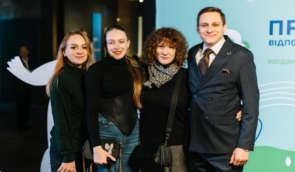ZMINA highlighted politically motivated persecution in the occupied territories at Helsinki+50 Conference side event
ZMINA and the Media Initiative for Human Rights (MIHR) held a side event, “The Future of the Helsinki Final Act: Restoring Justice and Ensuring Russia’s Accountability”, during the Helsinki+50 Conference on 31 July. The event focused on human suffering and the systematic persecution caused by Russia’s war of aggression against Ukraine and its systematic violations of the Helsinki Final Act.
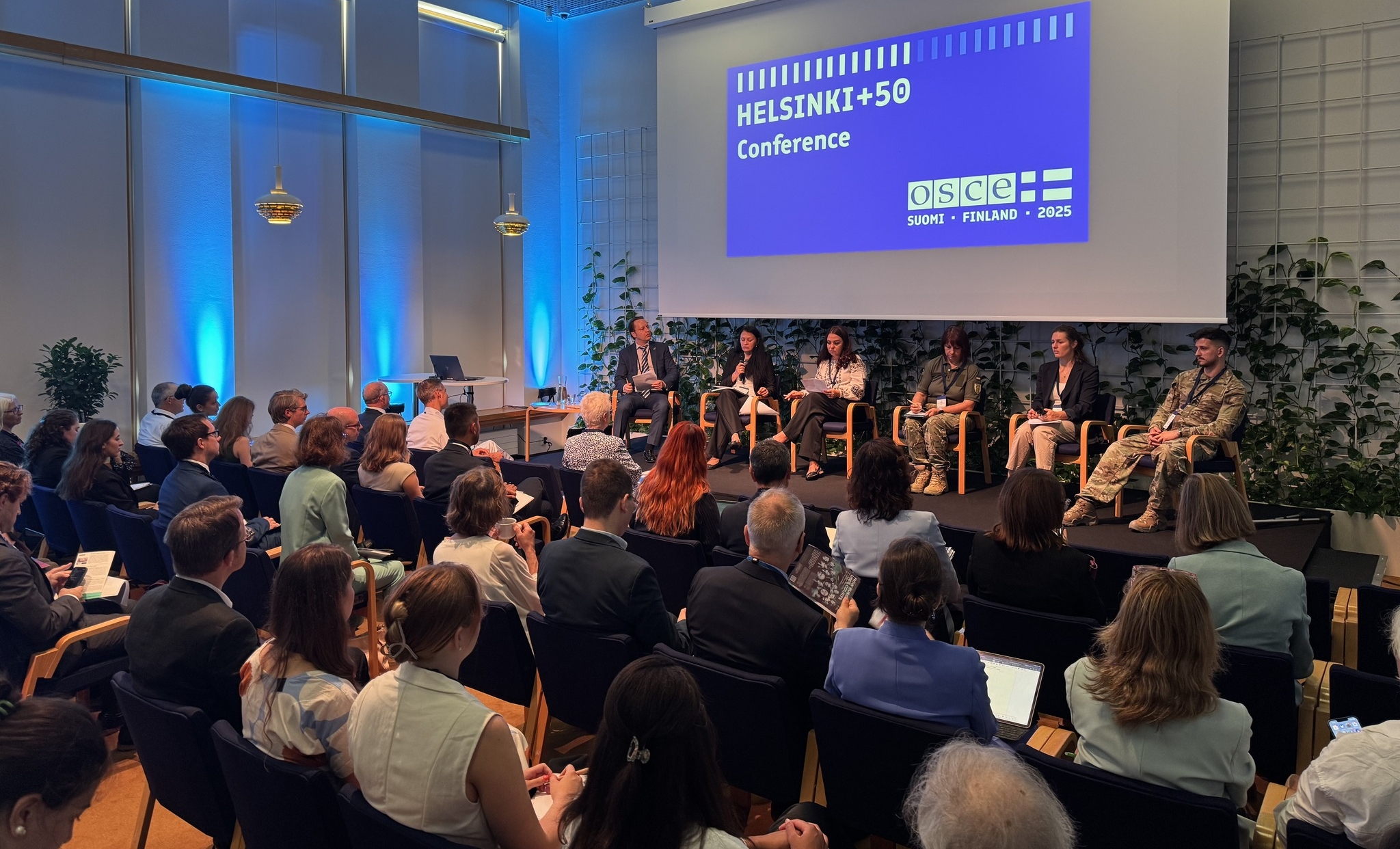 Photo: Side event. Credit: Media Initiative for Human Rights
Photo: Side event. Credit: Media Initiative for Human RightsWith the moderation of Ambassador Yurii Vitrenko, Permanent Representative of Ukraine to the International Organizations in Vienna, Ukrainian civil society representatives and released POWs discussed patterns of human rights violations and international crimes committed by Russia.
“Fifty years ago, 35 countries signed the Helsinki Act, a political document that recognized human rights as an integral part of international security, rather than an internal matter for individual states,” said Tetiana Katrychenko, Head of the Media Initiative for Human Rights.
All 10 Helsinki principles, beginning with sovereign equality and concluding with respect for human rights and the fulfillment of obligations under international law in good faith, are blatantly violated by the Russian Federation. In particular, speakers highlighted politically motivated persecution in the occupied territories, which openly violates the 7th Helsinki principle. The data from both ZMINA’s and MIHR’s study shows that the number of victims of such persecution by Russia may be as high as 5,000-6,000 Ukrainian citizens, including military personnel and civilians.
The Head of Board of ZMINA, Tetiana Pechonchyk, said: “Court proceedings against Ukrainian civilians and POWs in the Russian Federation and in the occupied territories do not meet the standards of the right to a fair trial — including equality of arms, evaluation of evidence, exclusion of evidence obtained under torture, the right to defense, presumption of innocence, openness of the trial process, and others. Russian judges, prosecutors, and investigators involved in this are just as much war criminals as those who kidnap, torture, and rape Ukrainian citizens. The so-called Russian court system is just another piece of the overall crime scene.“
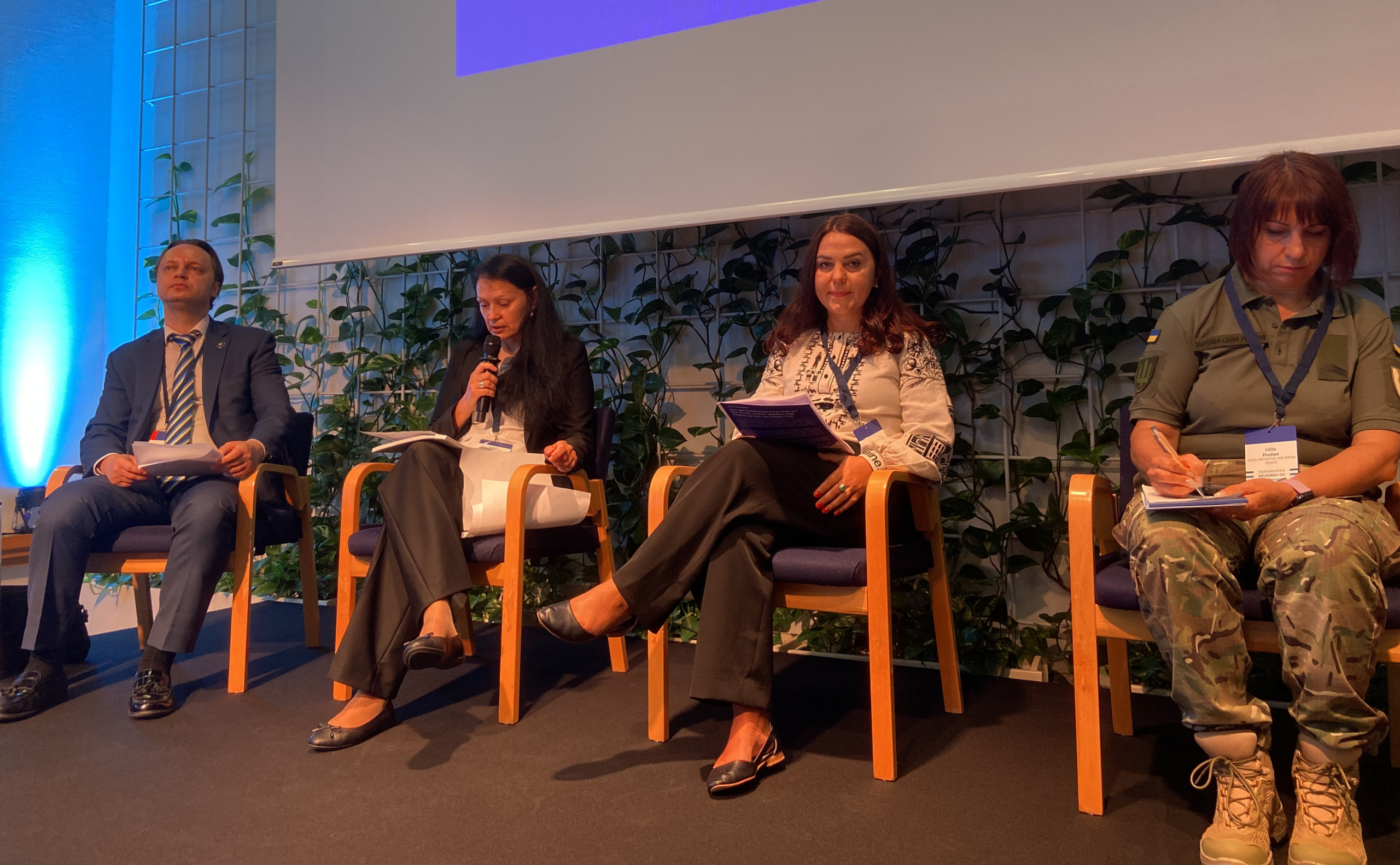 Photo: Side event. Credit: ZMINA
Photo: Side event. Credit: ZMINA“Russian investigators force Ukrainian POWs to confess to fabricated crimes using torture and psychological pressure. The guarantees of a fair trial are being violated. Courts are neither independent nor impartial, hearings are often held behind closed doors, and defendants lack effective legal defence and access to an appeal process,” stated MIHR’s Katrychenko. She added that trials are rushed, sentences are disproportionately harsh, and POWs rarely appeal because of the pressure.
In particular, Liliia Prutian, former POW facing a politically motivated trial, talked about the captivity when she was treated with utmost cruelty, tortured, and starved: “Investigators took me to the Donetsk pre-trial detention centre, put a bag on my head, made me crawl up the stairs and beat me up. They forced me to sign the document stating I refused legal aid from lawyers.”
She was accused of “violent seizure of power” and “participation in the activities of a terrorist organization” and was facing up to 30 years’ imprisonment. In September 2024, she was released as part of a prisoner exchange: “I am grateful for being liberated, but my brothers in arms remain in captivity — they are being tried for defending their home.“
Oleksandr Kuzmenko, a sergeant of the Azov Regiment, spent 2.5 years in captivity and was sentenced by a Russian court to 25 years of imprisonment: “When Russians captured me, I was tortured continuously. For three days, they tortured me to make me confess to killing civilians. I did not commit that crime, but they made me fabricate a confession. The entire case was built on it. They claimed I incited a killing by a comrade who was actually dead. The trial was a farce. My state-appointed lawyer spent the court hearings playing games on his phone.“
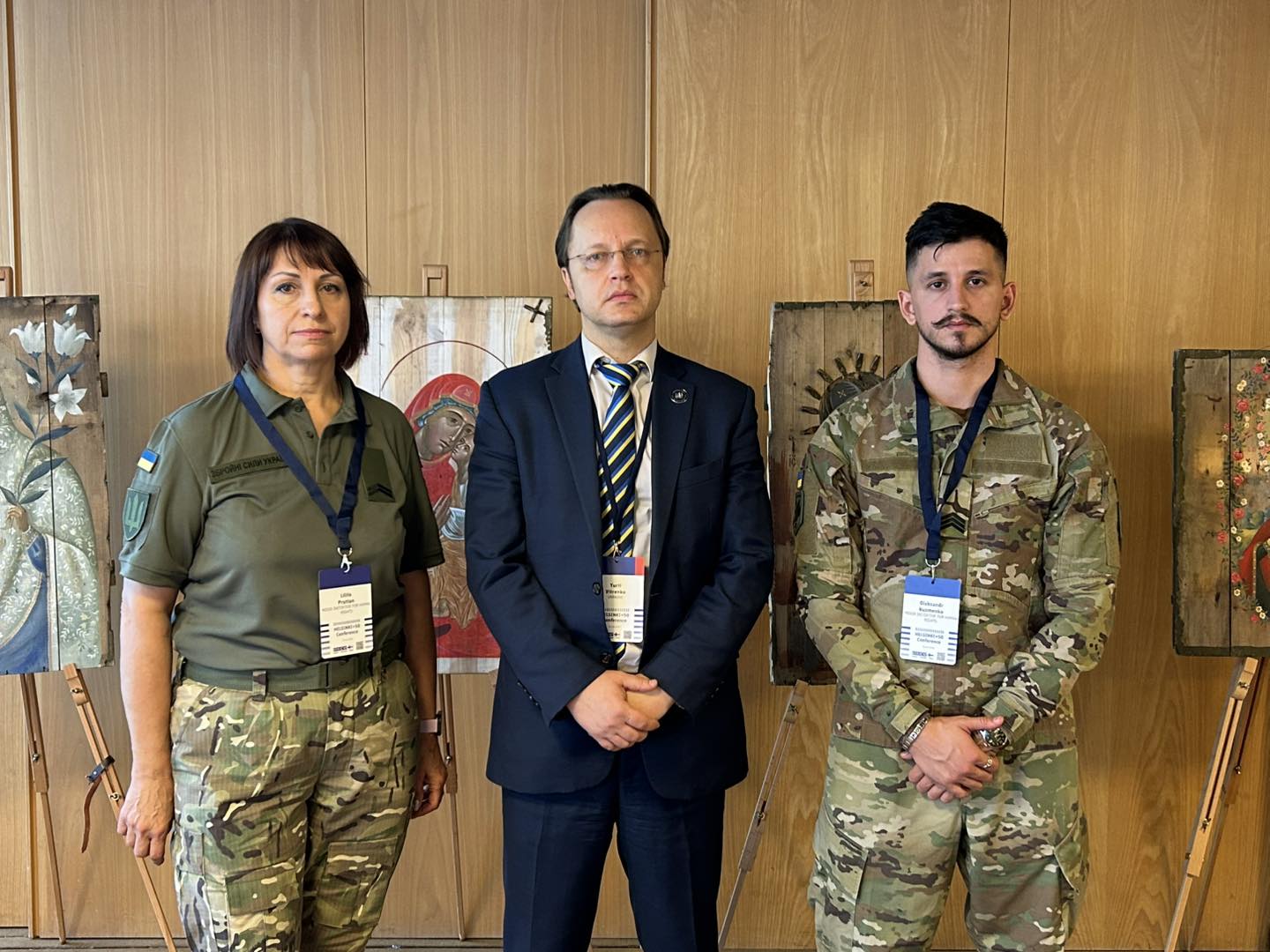 Photo: Liliia Prutian, Ambassador Yurii Vitrenko, Oleksandr Kuzmenko. Credit: Permanent Mission of Ukraine to the International Organizations in Vienna
Photo: Liliia Prutian, Ambassador Yurii Vitrenko, Oleksandr Kuzmenko. Credit: Permanent Mission of Ukraine to the International Organizations in ViennaZMINA’s Pechonchyk also reminded about the members of the OSCE Special Monitoring Mission, Vadym Golda, Maksym Petrov and Dmytro Shabanov, who were detained in April 2022 in Donetsk and Luhansk. These men were part of an international mission tasked with monitoring and reporting on the security situation in eastern Ukraine. Despite their protected status as international observers, they were accused of “high treason” and “working for American intelligence”. They got 13-14 years of imprisonment as a result of so-called “legal proceedings”. They faced torture, inhumane conditions and a lack of proper medical treatment in detention. Their continued imprisonment violates international law and the commitments made by Russia as a participating state in the OSCE.
ZMINA, together with the Ukrainian Legal Advisory Group and other civil society actors, urged OSCE and its Participating States’ governments to take urgent and coordinated action to secure their release and hold Russia accountable for these violations. Marharyta Shabanova, wife of the illegally detained Dmytro Shabanov, also addressed the audience, calling for the release of her husband.
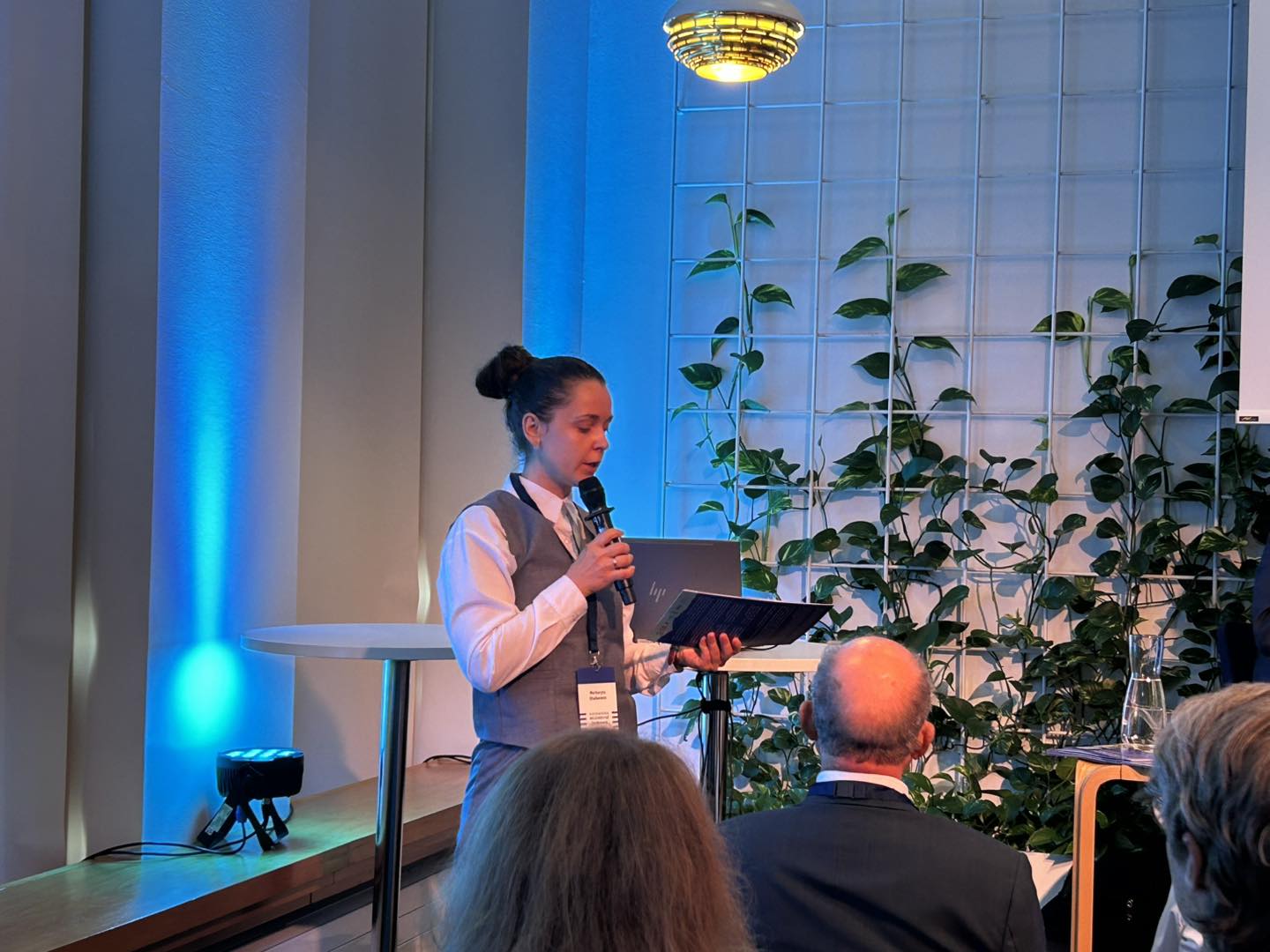 Photo: Marharyta Shabanova, wife of the illegally detained Dmytro Shabanov. Credit: Permanent Mission of Ukraine to the International Organizations in Vienna
Photo: Marharyta Shabanova, wife of the illegally detained Dmytro Shabanov. Credit: Permanent Mission of Ukraine to the International Organizations in Vienna“Russia is deliberately destroying human rights and freedoms that underlie the Helsinki Act and are an integral part of security in Europe. The level of cruelty of its army is shocking. This is the result of deliberate incitement to genocide at the highest state level. We must act now to save lives and to prevent new tragedies from happening again,” said Ambassador Yurii Vitrenko, Permanent Representative of Ukraine to the International Organizations in Vienna.
The criminal prosecution of POWs and civilian detainees is a deliberate and systematic policy of the Russian Federation. It bears the hallmarks of both war crimes and crimes against humanity. Experts have gathered today to speak out — to expose the Russian Federation’s criminal intent and hold it accountable.
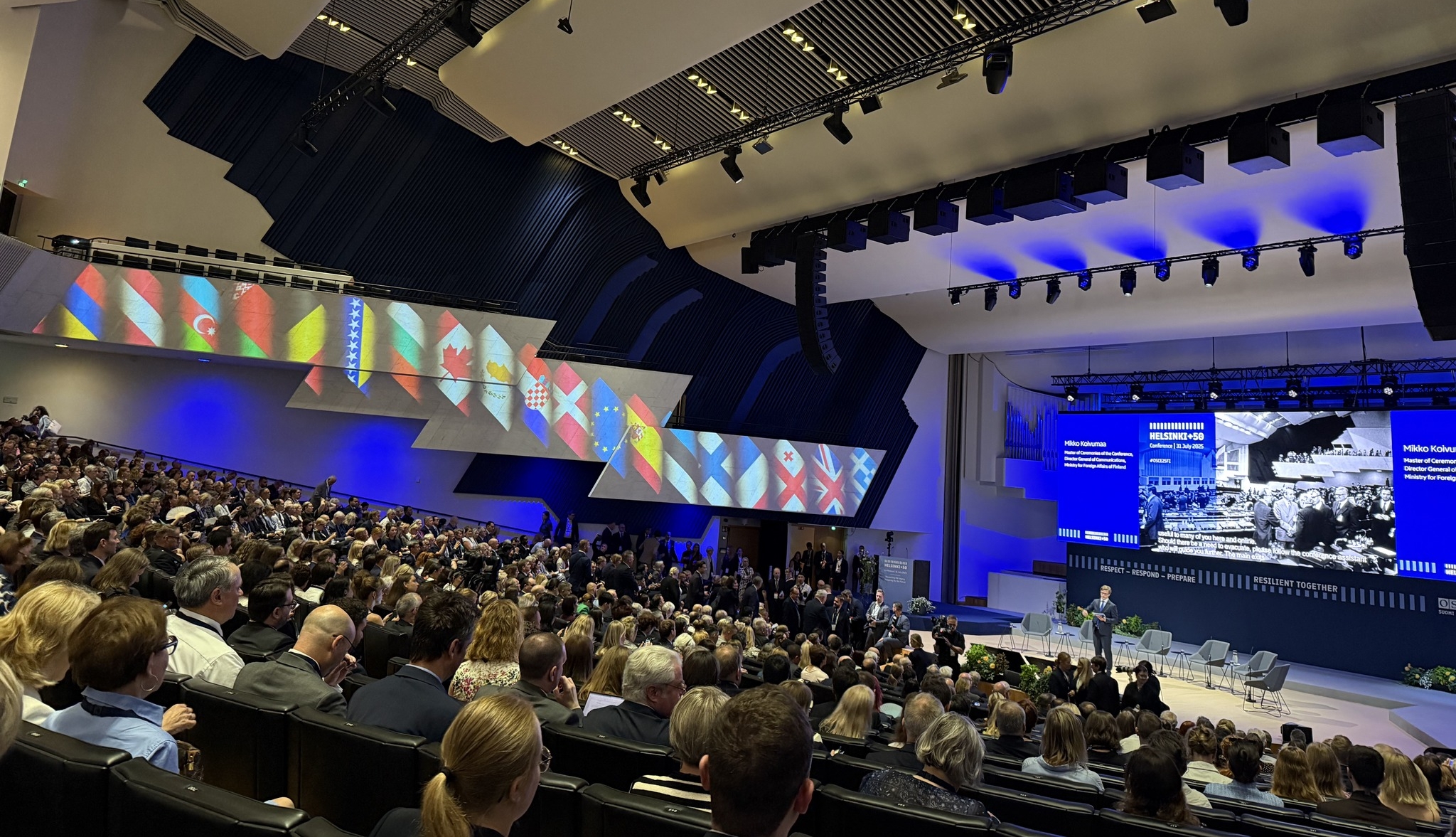 Photo: Conference Helsinki+50. Credit: ZMINA
Photo: Conference Helsinki+50. Credit: ZMINAFor information: The Helsinki+50 Conference marked the 50th anniversary of the Helsinki Final Act, a foundational document for peace, human rights, and security in Europe, signed in 1975. The conference brought together international experts, civil society, and policymakers to reflect on the legacy of the Helsinki Process and to address urgent threats to the principles it enshrined. In light of Russia’s aggression against Ukraine and its systematic violations of human rights, the Helsinki+50 platform served as a space to reaffirm the collective commitment to justice, accountability, and the protection of human dignity across the OSCE region.
If you have found a spelling error, please, notify us by selecting that text and pressing Ctrl+Enter.




